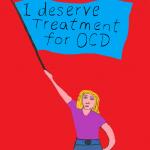How sleep can affect your mental health
October 9th 2019
One in three of us are said to have poor sleep*. Below I have gathered information on the close links between sleep and mental health, sleep disorders and solutions.
I have personally experienced poor sleep and it deeply affected my everyday life. I had a reverse sleep cycle, which meant that I was awake at night and asleep during the morning to early afternoon. It meant I was unable to do things during the day as between my OCD and sleeping issues I had no time. I would do rituals late into the night, which was the cause of the poor sleep, and the poor sleep contributed to worsening OCD symptoms.
It is possible to change things around. For me, gradually getting up earlier every day and not sleeping during the day regardless of tiredness meant I could do my rituals earlier and fall asleep earlier. When I was no longer so tired, I felt more able to fight my OCD. Sleep helps the brain to work as it should, preparing you for the next day, creating pathways so you can learn and remember information.
Positives of sleep include the improvement of mood, focus, the ability to make decisions and strengthening the immune system. Poor sleep can be a symptom of mental illness but can also lead to things like depression*. Sleep disorders can also be the cause of poor sleep.
A few examples follow.
- Sleep apnea: Having abnormal breathing patterns due to the narrowing and relaxation of the throat while you sleep.
- Insomnia: Where there is difficulty falling and/or staying asleep.
- Restless leg syndrome: An overwhelming and irresistible urge to move legs, often worse out of daytime hours.
Sleep hygiene: According to the National Sleep Foundation ‘Sleep hygiene is a variety of different practices and habits that are necessary to have good nighttime sleep quality and full daytime alertness’.
Following are some sleep hygiene tips (from the NHS website and National Sleep Foundation).
1. Aim to wake up and go to sleep at the same time every day.
2. Only use your bed for sleeping. Activities such as watching TV in bed will make you associate your bed with being awake.
3. Have your bedroom stay at a comfortable temperature.
4. Keep it quiet.
5. Have the room dark.
6. Consume caffeine carefully. (Having caffeine too close to when you go to bed can cause disrupted sleep).
7. Take a warm bath.
8. Try breathing exercises.
9. Muscle relaxation.
10. Avoid blue light (found in phone screens etc.) for at least one hour before bed.
I found waking up and and going to sleep at the same time every day particularly helpful, as it got my body into a good routine so I could get the amount of sleep needed to function during the day. Be sure to reach out to a professional if a lack of sleep is having a detrimental effect on your mental health.
*Information from the NHS website
*Information from The Royal College of Psychiatrists







